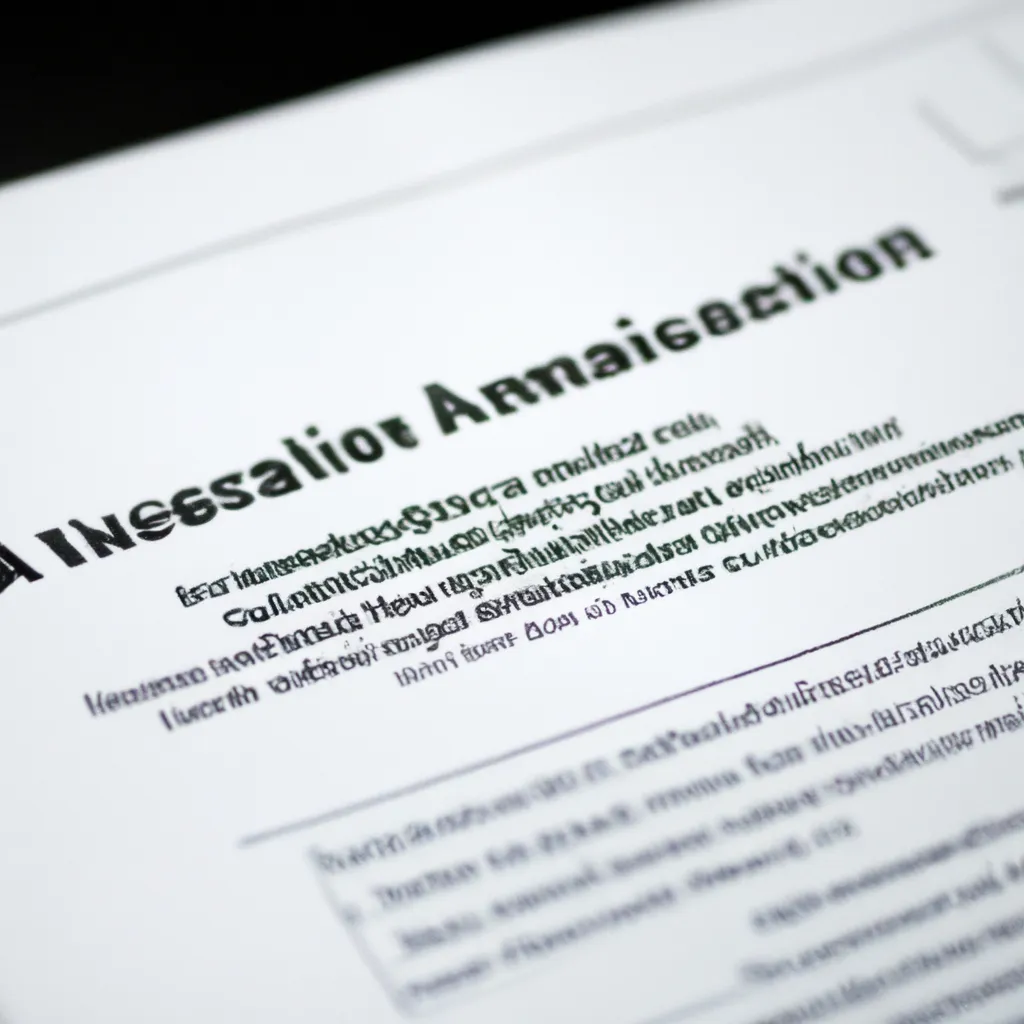Discover How inheritance tax in Montreal Can Increase Appreciation Are you aware of the potential benefits of inheritance tax in Montreal. This often-misunderstood tax can actually work in your favor when it comes to increasing appreciation. Let's explore this further. By imposing inheritance tax on inherited assets, the government encourages recipients to hold onto the assets and let them appreciate over time.
This allows for long-term growth and can lead to greater appreciation than if the assets were sold immediately. This tax strategy promotes responsible wealth management and can ultimately result in a larger inheritance for future generations. Imagine being able to pass down a larger inheritance to your loved ones, thanks to careful estate planning and the benefits of inheritance tax. It's a win-win situation that many wealthy individuals take advantage of, including some well-known financial experts such as Dave Ramsey and Suze Orman.
Don't overlook the potential for increased appreciation through inheritance tax in Montreal – consider speaking with a financial advisor or tax specialist to learn how it can benefit you and your loved ones in the long run.

What is inheritance tax?
Inheritance tax is a type of tax imposed on the inheritance of property or assets from one person to another. This tax is applicable in many countries, including canada, and it is also known as estate tax or death tax. In this article, we will focus on inheritance tax in montreal and explain the basics to help you understand and navigate the tax system more effectively.
Calculating inheritance tax in montreal
Montreal follows the accrual basis for calculating inheritance tax. This means that the tax is calculated based on the date of death of the account owner. The accounting period for inheritance tax in montreal is from january 1st to december 31st of the year when the person passed away.
The value of the inherited assets is determined based on the fair market value on the date of death. This value is then used to calculate the tax amount, which is paid by the beneficiaries of the inheritance.
Tax implications for the account owner and beneficiaries
For the account owner, inheritance tax is usually not a concern as it is their beneficiaries who are responsible for paying the tax. However, if the account owner has not designated any beneficiaries or the beneficiaries have passed away, then the estate of the account owner will be responsible for paying the tax.
On the other hand, beneficiaries must be aware of the tax implications of their inheritance. In montreal, the tax rate for inheritance can be as high as 40%, depending on the value of the assets inherited. Therefore, it is essential for beneficiaries to plan their finances accordingly to cover the tax amount when they receive their inheritance.
Exemptions and deductions for inheritance tax
There are certain exemptions and deductions available for inheritance tax in montreal, which can reduce the tax amount for beneficiaries. The most common exemption is the spousal exemption, where a surviving spouse does not have to pay any inheritance tax on the assets inherited from their deceased spouse.
Additionally, there are deductions available for charitable donations made through the inheritance, as well as deductions for expenses related to the administration of the estate. These exemptions and deductions can significantly reduce the tax burden for beneficiaries and should be explored carefully.
How to pay inheritance tax in montreal
In montreal, inheritance tax is paid to the provincial government. Beneficiaries must file a tax return and pay the tax amount within six months of the date of death. Failure to do so may result in penalties and interest charges.
It is also possible to make arrangements for payments to be made in installments over a period of ten years. However, interest will still be charged on the unpaid balance. Beneficiaries should consider this option if they are unable to pay the full amount upfront.
Navigating the inheritance tax system in montreal
Understanding inheritance tax can be complicated, and it is essential to seek professional advice to ensure compliance with tax regulations and to maximize exemptions and deductions. A tax advisor or a tax accountant can assist beneficiaries in understanding their tax obligations and help them navigate the tax system in montreal.
It is also crucial for beneficiaries to keep thorough records of all inherited assets and their value on the date of death, as these records will be needed for filing the tax return. This can include property appraisals, bank statements, investment portfolios, and other relevant documents.
Inheritance tax can seem overwhelming, but with proper planning and understanding of the tax system, beneficiaries can navigate the process effectively. It is crucial to seek professional advice and keep detailed records to ensure compliance with tax regulations and to minimize the tax burden. By following these guidelines, beneficiaries can inherit their assets seamlessly without the added stress of managing inheritance tax in montreal.

Why inheritance tax matters
Inheritance tax is a subject that is often overlooked when planning for the future. However, it is an important consideration for individuals and families who want to protect their assets and ensure their loved ones receive the maximum value from their estate. In this article, we will explore why inheritance tax matters, how it can impact the value of your estate, and strategies to minimize its effects.
Understanding inheritance tax and its impact on your estate
Inheritance tax, also known as death tax, is a tax that is imposed on certain types of assets that are transferred to an individual's heirs upon their death. It is important to note that not all assets are subject to inheritance tax. In many countries, including canada, inheritance tax is only levied on assets that were acquired through inherited wealth rather than those earned through personal income.
One of the key factors that impact the amount of inheritance tax paid is the location of the inherited assets. In canada, inheritance tax is managed at the provincial level, meaning that tax laws and rates may vary depending on where the assets are located. For instance, in the province of quebec, inheritance tax is referred to as “estate tax,” and is calculated based on the fair market value of the inherited assets rather than the purchase price. As such, it is important to understand the specific inheritance tax laws in your area in order to plan accordingly.
Minimizing inheritance tax and protecting your assets
For many individuals, the goal is to minimize the amount of inheritance tax paid and protect their assets for their loved ones. There are several strategies that can be implemented to achieve this objective.
One option is to make use of an estate freeze. This involves transferring the ownership of certain assets, such as a business, before the owner's death. By doing this, the value of the assets is frozen at the time of transfer, and the tax liability is also frozen, reducing the amount of inheritance tax that will be paid. This can be a complex process and it is important to seek the guidance of a tax professional before undertaking an estate freeze.
Another option is to make use of trusts, which are legal agreements that allow for the transfer of assets to a designated trustee. By placing your assets in a trust, you can protect them from inheritance tax as they are no longer considered part of your estate. Additionally, trusts can help to minimize the amount of taxes that your heirs will be required to pay on the inherited assets.
Inheritance tax vs. Estate tax
It is important to note the difference between inheritance tax and estate tax, as they are often used interchangeably but refer to different things. Estate tax is a tax on the total value of an individual's assets at the time of their death, whereas inheritance tax is a tax on specific assets that are inherited by the individual's beneficiaries. In essence, estate tax is paid by the estate itself, while inheritance tax is paid by individual beneficiaries.
In some cases, individuals may choose to transfer their assets during their lifetime in order to avoid both estate tax and inheritance tax. This is known as an “inter vivos” transfer and can be effective for individuals who have significant assets and want to minimize the tax burden on their heirs.
The importance of proper accounting and tax planning
Proper accounting and tax planning can greatly reduce the impact of inheritance tax on an individual's estate. This involves keeping accurate records of all assets, including their acquisition date and value, as well as choosing a suitable accounting period and accounting method, such as the accrual basis. By having a clear understanding of the value of your assets and employing effective tax planning strategies, you can minimize the amount of inheritance tax paid and protect your assets for your loved ones.
Inheritance tax is an important consideration for individuals and families when planning for the future. By understanding the impact of inheritance tax and implementing effective tax planning strategies, you can minimize the tax burden on your estate and ensure your loved ones receive the maximum value from your assets. It is important to seek the guidance of a tax professional to ensure that your assets are protected and that you are in compliance with all applicable tax laws. 
Navigating inheritance tax in montreal
Inheritance tax can be a complicated and confusing topic, and it's important to understand the specific rules and regulations that apply to montreal residents. In this section, we will explore the key aspects of inheritance tax in montreal, including potential exemptions and deductions, and the importance of proper estate planning to minimize tax implications.
Understanding inheritance tax in montreal
Inheritance tax, also referred to as estate tax or death tax, is a tax imposed on the transfer of assets or property from a deceased person to their heirs. In montreal, inheritance tax is governed by the quebec civil code and is based on the accrual basis, meaning it is calculated on the value of assets at the time of the deceased's death.
The tax rate for inheritance tax in montreal can vary depending on the value of the estate and the relationship between the deceased and the heirs. Generally, the tax rate can range from 0.7% to 33%, with higher rates applied to larger estates and non-relatives as beneficiaries.
It's important to note that inheritance tax is separate from income tax, which is applicable to the deceased's final income tax return. However, if the deceased had any outstanding income tax obligations, it must be settled before the inheritance tax can be calculated and paid.
Potential exemptions and deductions
While the rules and regulations around inheritance tax in montreal can seem overwhelming, there are some potential exemptions and deductions that can help lower your tax liability.
One of the most common exemptions is the inheritance of a family residence. If the heir inherits a primary residence from their deceased relative, they may be exempt from paying inheritance tax on that property. The residence must have been the primary residence of the deceased at the time of their death and must continue to be used as the primary residence by the heir for a minimum of one year after the inheritance.
Additionally, charitable donations made by the deceased can also qualify for a tax deduction on the inheritance tax return. This can help reduce the overall tax liability for the estate.
It's important to note that these exemptions and deductions may differ for each situation, so it's advisable to seek professional advice from a tax accountant or lawyer to fully understand your rights and eligibility.
The importance of estate planning
Proper estate planning is crucial when it comes to minimizing inheritance tax implications in montreal. By creating a strategic estate plan, you can ensure that your assets are protected and passed on to your heirs in the most tax-efficient way possible.
One way to potentially reduce inheritance tax liability is by gifting assets during your lifetime. By gifting assets to your heirs before your death, you may be able to reduce the value of your estate and, therefore, your tax liability. However, it's important to consult with a professional before making any significant gifts to ensure it aligns with your overall estate plan.
Another important aspect of estate planning is writing a will. A properly drafted will can help distribute your assets according to your wishes while minimizing the tax burden for your heirs. Without a will, your assets may be subject to intestate succession rules, which may result in a larger tax liability for your heirs.
It's also worth considering setting up a trust to protect and manage your assets. A trust can provide certain tax advantages and can help ensure that your assets are distributed to your heirs according to your wishes, with minimal tax implications.
Final thoughts
Navigating inheritance tax in montreal can be a complex and daunting task, but with the right understanding and planning, you can minimize the tax implications for your heirs. By understanding the specific rules and regulations, exploring potential exemptions and deductions, and prioritizing proper estate planning, you can protect your assets and ensure that your loved ones are taken care of after your passing.
Remember, it's always advisable to seek professional advice from a tax accountant or lawyer to ensure you are following the correct protocols and maximizing your tax planning strategies. With proper guidance, you can successfully navigate the world of inheritance tax in montreal and ensure that your legacy is preserved for future generations.
Increasing appreciation with inheritance tax planning
When it comes to planning for the future, there are numerous factors to consider. One crucial aspect that often gets overlooked is inheritance tax planning. Inheritance tax, also known as estate tax, refers to the taxes imposed on inherited assets or properties. This tax can significantly impact the value of your assets and ultimately impact your loved ones and their inheritance.
If you are a resident of montreal, you must understand the impact of inheritance tax and explore potential tax-saving strategies to ensure the maximum value of your inheritance for future generations. In this section, we will delve deeper into inheritance tax planning and its benefits, as well as explore various tax-saving strategies that can help you minimize your tax liability.
Understanding inheritance tax and its impact
Inheritance tax is a type of tax that is levied on the transfer of assets or properties from a deceased individual to their beneficiaries. The amount of inheritance tax owed is based on the value of the inherited assets and the relationship between the deceased and the recipient.
In canada, inheritance tax is typically calculated based on the accrual basis, meaning it is only applicable to assets that have appreciated in value from the time they were acquired until they are inherited. The tax rate can differ between provinces, with quebec having its own inheritance tax laws. In some cases, certain exemptions or deductions may apply, depending on the size of the estate and the relationship between the deceased and the beneficiary.
The impact of inheritance tax can be significant, as it can reduce the value of the inherited assets and even lead to financial difficulties for the beneficiaries. Therefore, taking steps to mitigate these taxes through proper planning can help preserve your legacy and ensure that your loved ones receive the full value of their inheritance.
Exploring tax-saving strategies for inheritance tax planning
Fortunately, there are various tax-saving strategies that can be implemented to minimize your inheritance tax liability. These strategies can range from simple gifting to more complex trust arrangements. Some common strategies include:
1. Gifting
One way to reduce your inheritance tax liability is to gift your assets to your loved ones during your lifetime. Giving gifts of money or assets to your beneficiaries while you are alive can help reduce the value of your estate, and therefore, the amount of inheritance tax owed. However, it is essential to note that there are specific rules and limitations for gifting, and it is crucial to seek professional guidance to ensure you are following the proper procedures.
2. Establishing a trust
Another tax-saving strategy for inheritance planning is to establish a trust. A trust is a legal arrangement that allows you to transfer your assets to a trustee who will manage and distribute the assets according to your instructions. By doing so, you can potentially reduce or delay the inheritance tax owed on the assets, as they are no longer considered part of your estate.
3. Life insurance policy
A life insurance policy can also be an effective tool for inheritance tax planning. By designating your beneficiaries as the policy's beneficiaries, the death benefit proceeds can pass directly to them, outside of your estate. This means that the money is not subject to inheritance tax, allowing your loved ones to receive the full benefit.
4. Capital gains exemption
For business owners, the lifetime capital gains exemption can be a useful tax-saving strategy for inheritance planning. The exemption allows you to reduce or eliminate the capital gains tax on the sale of your business or qualified farm or fishing property. By implementing this strategy, you can potentially reduce your estate's value and, in turn, minimize the inheritance tax liability.
The lasting impact of inheritance tax planning on your legacy and loved ones
Inheritance tax planning is not just about minimizing tax liability; it is also about preserving your legacy and ensuring that your loved ones receive the benefits of your hard work and success. By investing time and resources into proper estate planning and exploring various tax-saving strategies, you can protect your wealth and pass it on to future generations.
Moreover, implementing these strategies early on can also help reduce the stress and burden on your loved ones during a difficult time. By having a solid inheritance tax plan in place, you can provide your family with peace of mind and allow them to focus on preserving your legacy and honoring your memory.
Inheritance tax planning is a crucial aspect of estate planning that should not be overlooked. By understanding the impact of inheritance tax and exploring potential tax-saving strategies, you can ensure the maximum value of your inheritance for future generations. Remember to seek professional guidance from an experienced financial advisor or tax professional to develop a customized plan that aligns with your financial goals and objectives.

